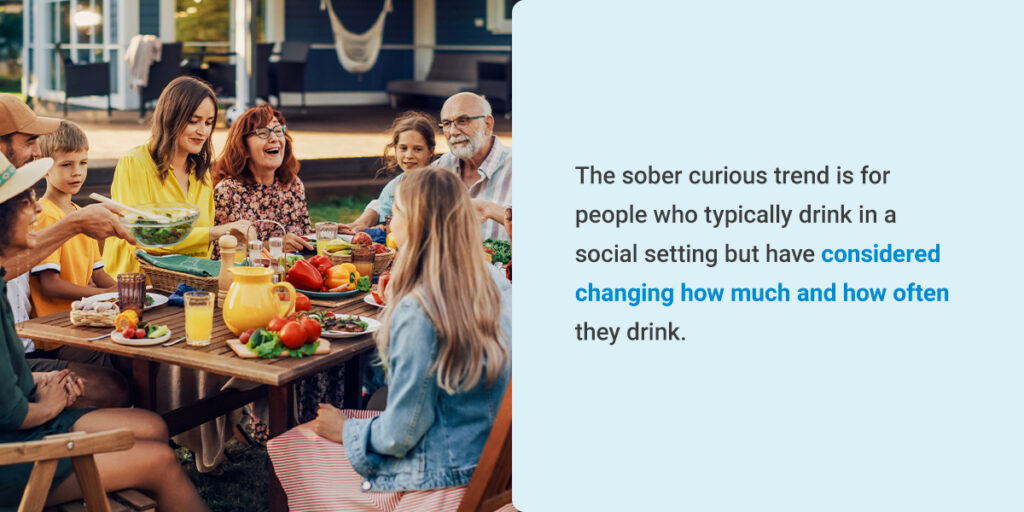- Oct 14
- Addiction

Have you ever stopped to evaluate your relationship with alcohol? Most people over 18 have consumed alcohol at some point in their lives. The Centers for Disease Control and Prevention (CDC) recommends adults either abstain from drinking alcohol or drink in moderation. Moderate drinking is defined as two drinks or less per day for men. For women, it is one drink or less per day. Many people drink more than the recommended amounts for moderate consumption. For example, many people participate in binge drink or high-intensity drinking.
If you have ever drank too much, you are probably familiar with the next-day hangover. This might cause you to stop and think about how much you drink and whether you should change your drinking habits. You might be sober curious.
What Does It Mean to Be Sober Curious?
Drinking is a normalized activity for many people in their personal and professional lives. It is common for friends and family to share drinks casually or during life milestones, like weddings. Cocktail hour after work or networking events for your career often feature an open bar. Some people may find it difficult to limit their consumption at events like these. The sober curious trend is for people who typically drink in a social setting but have considered changing how much and how often they drink.
Sober curious people imagine what their lives would look like without alcohol and ask themselves questions about alcohol’s place in their lives, such as:
- How would my social life change if I stopped drinking?
- Would my friends still enjoy spending time with me if I decided to stop drinking?
- Would I find healthier methods for coping with periods of stress?
- Could I embrace other healthy lifestyle choices if I cut back on drinking?
Someone who is sober curious drinks occasionally but takes time to question the place alcohol has in their lives. They might even stop drinking entirely for periods to explore what a wholly sober life would be like.

Where Did the Sober Curious Movement Begin?
The sober curious meaning can be traced back to Dry January. Dry January is now widely recognized as a period to abstain from alcohol. The very first Dry January was in 2013. Alcohol Concern, a U.K.-based organization, started the event. Today, that organization is known as Alcohol Change. The Dry January public health campaign started with just 4,000 people that first year, and in 2021, that number grew to 130,000, according to the Alcohol Change website. Dry January has spread much further than the U.K., with participants in many different countries, including the U.S.
Dry January is part of the larger sober curious movement, which invites people to pause drinking and reassess their relationship with alcohol at any time. Ruby Warrington introduced the term when she published Sober Curious: The Blissful Sleep, Greater Focus, Deep Connection, and Limitless Presence Awaiting Us All on the Other Side of Alcohol in 2018.
The Benefits of Being Sober Curious
Why is the sober curious lifestyle capturing the attention of so many people? Exploring the possibilities of a sober life can come with many benefits, including:
- Understanding the role alcohol plays in your life: Many people never think about their drinking. They don’t feel dependent on alcohol, nor has anyone raised any concerns about their drinking, so they don’t worry about why they engage in the drinking patterns they do. Being sober curious allows people to take a step back and see how alcohol fits into their lives. Being sober curious doesn’t necessarily mean giving up alcohol entirely, but it can help you better understand your drinking habits and find ways to moderate your drinking.
- Potential physical health benefits: Alcohol has documented health risks, including an increased risk of cancer and liver disease. Even a short cessation of drinking may give you a glimpse at the potential health benefits of reducing your alcohol consumption. You may sleep better, lose weight, lower your blood pressure or feel more energetic.
- Potential mental health benefits: You may also discover that drinking less is better for your mental health than heavy drinking. Some people may use drinking as a coping mechanism for anxiety or depression, but there are healthier ways to cope. Being sober curious may allow you to understand your mental health better and explore other ways to improve it, such as self-care or therapy.
Tips for Managing Alcohol Consumption
The sober curious trend can lead to less drinking. Here are some ways you can embrace this trend and manage your alcohol consumption:
- Set goals for yourself: Setting and achieving goals can be a positive tool for people exploring the sober curious lifestyle. Dry January can be a good place to start because many other people decide to participate. But you can also set your own goals. For example, you can choose specific days or weeks to remain sober.
- Choose where you will drink: Many people drink because the situation seems to call for it. If you are sober curious, you can limit the places and events where you drink. For example, you can decide not to drink at home. Or, you can decide you will only drink during specific social situations, such as dinner out with friends.
- Explore other hobbies: Alcohol is central to many social activities. If you find it tougher to refrain from drinking in certain social situations, consider exploring other hobbies that don’t involve drinking.
- Ask for support: Peer pressure, subtle or overt, can make living sober curious challenging. Let your close family and friends know that you are exploring sobriety and ask for them for their support.
Reach out to Gateway Foundation
People who aren’t struggling with addiction can use the sober curious approach to change the way they engage in drinking. But some people who need to change their relationship with alcohol are living with substance dependence. Alcohol use disorder can significantly affect your health in the short and long term, but quitting drinking isn’t always easy. Alcohol addiction calls for professional help. At Gateway Foundation, we can help you face and beat alcohol addiction. Contact us today to learn how you can break the cycle of addiction and begin your journey to sober living.



